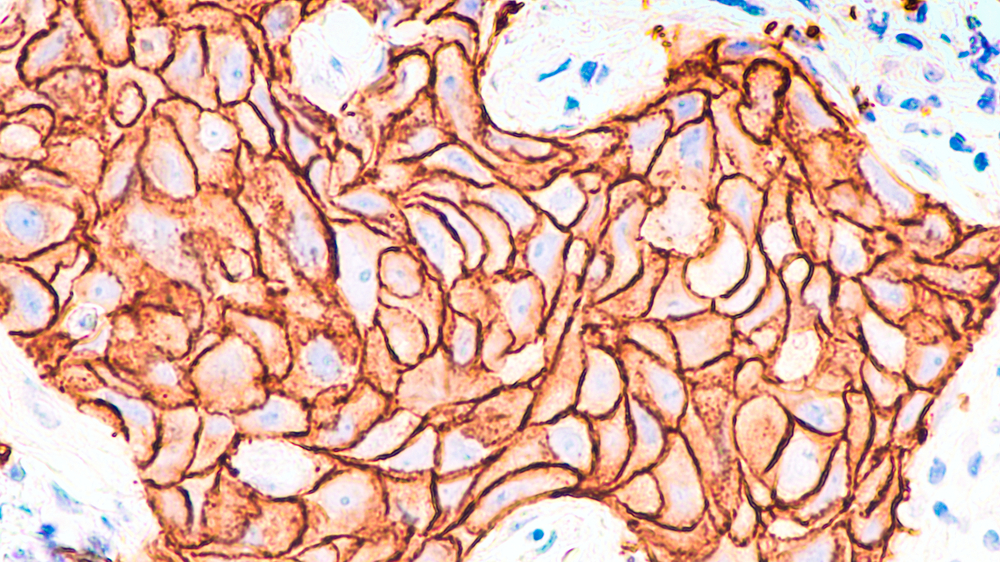-
Cancer
Mayo Clinic researchers identify a potential new approach to treat HER2 positive breast cancer

ROCHESTER, Minn. – Researchers at Mayo Clinic have identified an important new pathway by which HER2 positive breast cancers grow and have discovered that a dietary supplement called cyclocreatine may block the growth of HER2 positive breast cancer. Their findings were published today in Cell Metabolism.
“The HER2 receptor tyrosine kinase, which functions as an ‘on’ or ‘off’ switch in cellular functions, is a key driver of breast cancer, and is overexpressed in about a quarter of all breast cancers,” says Taro Hitosugi, Ph.D., a pharmacologist at Mayo Clinic and corresponding author of the paper. “While drugs such as trastuzumab improved outcomes for some patients with HER2 positive breast cancer, some tumors are or may become resistant to this drug.”
Dr. Hitosugi and his colleagues decided to explore ways to resolve this unmet clinical need. Their strategy was to develop a treatment to target tumor mitochondrial energy metabolism, which is the process cancer cells use to manipulate energy during cell metabolism in order to grow.
The challenge for researchers was to determine which mitochondrial enzymes were activated by HER2 cancer cells. “We employed metabolomics and proteomics approaches to identify HER2-dependent metabolic events, and discovered that HER2 signaling activates mitochondrial creatine kinase 1,” says Dr. Hitosugi.
Dr. Hitosugi and his colleagues discovered that cyclocreatine, a dietary supplement used in sports drinks, effectively targets mitochondrial creatine kinase 1 enzyme and reduces cancer growth without toxicity. This finding was confirmed in mice models where a patient-derived, trastuzumab-resistant HER2 positive tumors were administered to the mice.
“Mitochondrial creatine kinase 1 may be a new drug target for the treatment of HER2 positive breast cancer,” says Matthew Goetz, M.D., director of the Mayo Clinic Breast Cancer research program. “Future clinical trials will be necessary to determine the effectiveness of this drug for HER2 positive breast cancer resistant to standard therapies.”
Dr. Hitosugi would like to recognize Kiran Kurmi, Ph.D. the first author of the study, whose Ph.D. thesis led to this study.
This research was supported in part by the Mayo Clinic Breast Cancer SPORE Career Enhancement Program, the Susan G. Komen Foundation (CCR14300798), the Mayo Clinic Center for Individualized Medicine, Nadia’s Gift Foundation, John P. Guider, the Eveleigh Family, George M. Eisenberg Foundation for Charities, the Prospect Creek Foundation, and the Randy Shaver Cancer Research and Community Fund. The clinical trial using cyclocreatine is funded by an anonymous benefactor.
###
About Mayo Clinic Cancer Center
As a leading institution funded by the National Cancer Institute, Mayo Clinic Cancer Center conducts basic, clinical and population science research, translating discoveries into improved methods for prevention, diagnosis, prognosis and therapy. For information on cancer clinical trials, call the clinical trials referral office at 1-855-776-0015 (toll-free).
About Mayo Clinic
Mayo Clinic is a nonprofit organization committed to clinical practice, education and research, providing expert, comprehensive care to everyone who needs healing. Learn more about Mayo Clinic. Visit the Mayo Clinic News Network.
Media contact:
- Joe Dangor, Mayo Clinic Public Affairs, 507-284-5005, newsbureau@mayo.edu







